AI and ChatGPT, in particular, have created a buzz in the tech world and are constantly trending on Twitter with their sophisticated responses and dynamic nature. Despite being a well-established technology, AI has seen significant advancements in the past year.
As expected, HR departments are poised to reap the benefits of these advancements as companies explore ways to integrate AI into their operations for improved person-to-person communication and streamlined administrative tasks.
In this article, we delve into the impact of AI tools on HR and how they can help companies stay ahead of the competition while freeing up resources to focus on strategic initiatives.
Generative AI And ChatGPT

Generative AI is a powerful tool that can generate new content, from comprehensive articles to social media posts. The latest breakthrough in this field is the ChatGPT (Chat Generative Pretrained Transformer), which has garnered great attention.
Developed by the OpenAI research lab, the ChatGPT is an AI-powered chatbot that can mimic human-like conversations on various subjects. Simply input a question and receive a response in natural language generated using vast amounts of data processed by the AI.
In his book “Breakthroughs of the Year” for 2022, Derek Thompson highlighted ChatGPT as a critical player in the AI revolution that will fundamentally change how we think, work, and create original content.
Implications Of AI In HR
When it comes to HR, generative AI can help with people operations and employee engagement along the employee lifecycle. Let’s dive deep into the various potential applications of AI in the HR field
Recruiting
Famous recruiting thought leader Glen Cathy studied the opportunities for leveraging ChatGPT to recruit new talents. His finding confirmed that, despite being at its early stage, ChatGPT shows impressive results and can quickly write job descriptions, interview prompts, dialogues, and email communications. The chatbot can support content creation and streamline talent acquisition along the candidate journey.
Employee Engagement

We all know that engaged employees are far more productive, stick with the company longer and help managers recruit the best talent. However, it can be challenging to keep them engaged, especially during the post-pandemic. Most people start working from different locations on different days, and generating ideas and coordinating with them is challenging.
Tools like ChatGPT allows HR to get creative employee engagement ideas and comprehensive execution instructions easily. HR specialists and team leaders can quickly go from not having a clear action plan to creating a positive employee experience by giving ChatGPT simple prompts.
The beauty of the tool lies in the fact that by continuing the conversation and providing further information, HR can fine-tune the ideas to make them relevant and meaningful.
Internal Communications

Internal communication is an essential aspect of workforce management and occupies a substantial portion of any company’s HR. With generative AI tools, all you have to do is give it a prompt, and it will automatically write the message or create the right visuals for you. You can use it to develop an idea for the content, do research, write a title, and create an innovative first draft. Suppose you don’t like the writing; you can improve it with a simple prompt.
Segmentation
Although personalized internal messages are much more impactful, HR usually writes one-size-fits-all communications because personalization is often arduous. This is where AI tools come to the rescue.
With the help of AI, we can better understand each of the internal target audiences and segment the employees to craft messages that work for them. A research from MetLife proves that segmentation is a great way to improve recognition, impact, and communication.
Tools like ChatGPT barely takes a few seconds to rewrite the messages for different job levels or tones of voice, increasing the communication’s effectiveness tenfold.
Employer Branding

AI is proving to be one of the most viable tools to help organizations tell their brand story cohesively. A decisive point was raised by HRMS, highlighting that AI plays a crucial role in improving and creating a stronger employer brand. Given their abilities to create original yet tailored content, AI tools can “take over” tasks such as writing social content copy and generating visuals to accompany employer branding posts.
HR Services
In addition to tackling the creative elements of HR jobs, AI tools can also handle the more ordinary parts of HR. They can automate a considerable amount of the manual work done by HR.
AI can internalize frequently asked questions about policies and processes via an employee chat window to handle employee queries. Such tools can also take over much of the manual people analytics work, allowing HR to focus on the areas that need real human attention.
Final Words
Though generative AI tools may have limitations and are unlikely to fully replace human employees, the technology has the potential to significantly impact and transform the way companies conduct their operations.
The rise of AI is an opportunity for HR to find innovative ways to work: With AI, we can automate repetitive tasks and focus on our “human skills.” So let’s not be afraid of AI: give it a try and use it to our advantage.
This article was originally published on FlexOS.



